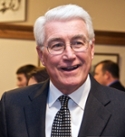April 28, 2017
Simon Institute’s 20th anniversary event features Jim Edgar
 CARBONDALE, Ill. -- Former Illinois Gov. Jim Edgar will reflect on 20 years of Southern Illinois University Carbondale’s Paul Simon Public Policy Institute next week.
CARBONDALE, Ill. -- Former Illinois Gov. Jim Edgar will reflect on 20 years of Southern Illinois University Carbondale’s Paul Simon Public Policy Institute next week.
Edgar will deliver the keynote speech of the institute’s spring 2017 event schedule at 6 p.m., Thursday, May 4, in the Student Center Auditorium. The event is free and open to the public.
This year marks the 20th anniversary of the institute’s founding in 1997. Edgar, the 38th governor of Illinois, signed the documents creating the institute at SIU Carbondale on Sept. 18, 1995 -- prior to Simon’s retirement from the U.S. Senate in 1997. At the time, Edgar said of Simon and the institute: “He will bring a strong commitment to public service, a thoughtful approach to confronting the vital issues of the day, a fundamental decency and unshakable integrity to this important, exciting venture.”
Jak Tichenor, interim institute director, said it was only appropriate that Edgar be the keynote speaker. Edgar and Simon knew each other from their time in Springfield, and more importantly, “both valued bipartisan consensus on tackling some of the tougher issues back in the day,” Tichenor said.
Prior to serving as governor from 1991 to 1999, Edgar, a Republican from Charleston, was Illinois secretary of state from 1981 to 1991. He was elected to the Illinois House of Representatives in 1976 and re-elected in 1978 but resigned in 1979 to serve as legislative liaison to then-Gov. Jim Thompson.
Tichenor said he anticipates Edgar will also discuss bipartisanship and consensus building today in the state. Tichenor notes one important accomplishment early in the institute’s history while Edgar was governor was passage in 1998 of the first significant campaign finance reform legislation in Illinois in more than 20 years. A bipartisan coalition was able to gain passage of a law prohibiting political fundraisers in Springfield on days the legislature was in session, Tichenor said.
When he became governor, Edgar inherited what at the time was the largest deficit in the state’s history, but was able to eliminate a backlog of $1 billion in unpaid health care bills. During his two terms, Edgar pushed through income tax relief provisions, property tax caps and adequate school funding. He was re-elected in 1994 by the widest plurality of any incumbent Illinois governor and won 101 of the state’s 102 counties, including Cook County. He left office in 1999 with $1.5 billion in the state coffers for his successor.
Edgar “was one of the most popular Illinois governors in recent times,” Tichenor said. “It’s obvious that a lot of people will be interested to hear what his thoughts are on the Simon Institute’s work on public policy and student education.”
After leaving office, Edgar was a resident fellow at the John F. Kennedy School of Government at Harvard. He is a distinguished fellow at the University of Illinois’ Institute of Government and Public Affairs, and spearheads the Edgar Fellows program. He is president emeritus of the Abraham Lincoln Presidential Library Foundation and serves on several corporate and non-profit boards.
